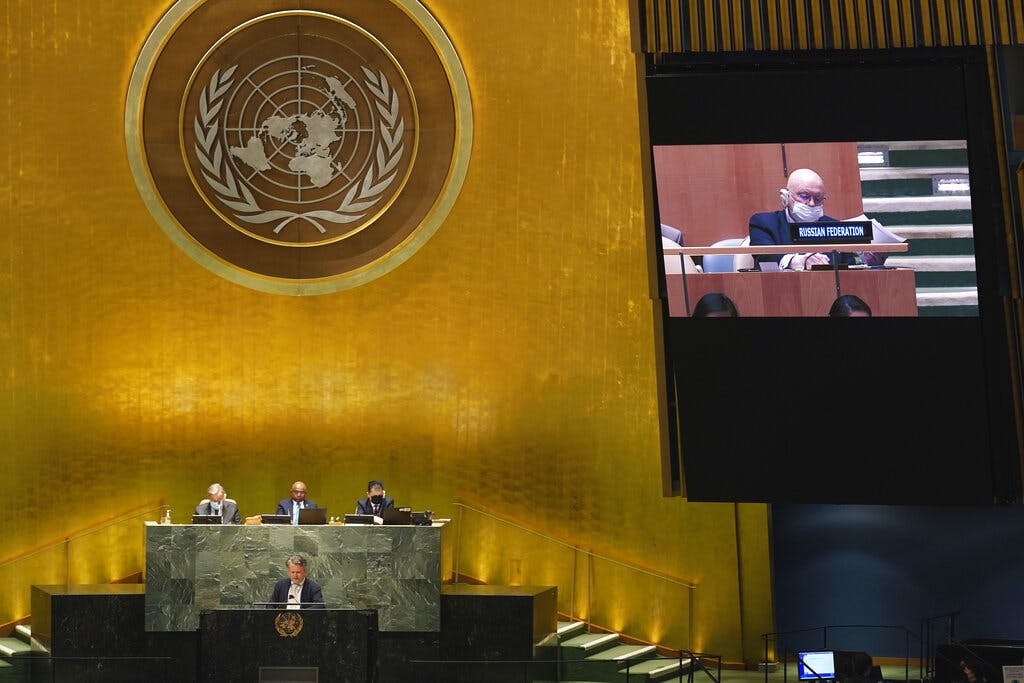‘Rubbish’ Is Russia’s Answer to the Sun on Ukraine’s Bid to Oust Its Attacker From United Nations
‘The country that commits war crimes against civilians cannot be a member of the U.N. Security Council.’

“Rubbish” is Russia’s answer to growing demands that it be stripped of the powerful Security Council seat it holds at the United Nations — and even of its membership in the world body.
Moscow’s ambassador to the U.N., Vitaly Nebenzya, used that one-word riposte when The New York Sun asked him about Ukraine’s repeated challenges to the method by which the Russian Federation assumed in 1991 the permanent seat previously held in the Security Council by the Soviet Union.
Ending a speech at the General Assembly, the Ukrainian ambassador, Sergeiy Kyslytsya, paused for a moment on Monday and looked around the hall where diplomats from the body’s 193 countries intently hung on each of his words. He then asked which of them voted to allow Russia a U.N. seat.
“Anyone?” Mr. Kyslytsya said, asking the delegates to raise their hands.
When no one answered, he said, “I put on my glasses.” Then, after donning his spectacles for effect, he peered at the assembled worthies and said, again, “Anyone voted for Russia’s membership?” No one raised a hand.
His plea to push Russia out of Turtle Bay was backed today by President Zelensky, who said, “The country that commits war crimes against civilians cannot be a member of the U.N. Security Council. This country has to be banned from all the ports, channels, and airports in the world.”
Another push came from Congress, where Senator Blackburn of Tennessee and Representative Claudia Tenney of New York led a group of Republicans calling on President Biden to strip Russia of its permanent Council seat.
The seat allows Moscow to veto resolutions — as it did Sunday, when it scuttled an American-proposed resolution that deplored the Russian invasion of Ukraine and demanded it withdraw its forces there.
Russia “is actively killing innocent Ukrainian civilians, committing war crimes, and invading sovereign territory unprovoked,” Ms. Blackburn wrote in a statement. “At the same time, Moscow is driving decisions in the United Nations through its role as a Permanent Member of the Security Council. Russia must be exiled from the international community.”
On Monday the Russian envoy, Mr. Nebenzya, accused Washington of violating the U.N. charter after he found out, during a press conference, that America intends to expel 12 residents at the Russian mission to the world body. Mr. Nebenzya accused America of violating the June 26, 1947, agreement that was signed at Lake Success and set relations between America, as host country, and the United Nations.
In a statement Monday, Olivia Dalton, a spokeswoman for America’s ambassador at the U.N., pushed back against Mr. Nebenzya’s allegation.
America, Ms. Dalton wrote, “has informed the United Nations and the Russian Permanent Mission to the United Nations that we are beginning the process of expelling twelve intelligence operatives from the Russian Mission who have abused their privileges of residency in the United States by engaging in espionage activities that are adverse to our national security. We are taking this action in accordance with the UN Headquarters Agreement. This action has been in development for several months.”
Nevertheless, Washington has so far shrunk from backing Ukraine’s demand to expel all Russian diplomats at the U.N. On Sunday, the American ambassador, Linda Thomas Greenfield, told CNN that as Russia’s permanent seat is written in the U.N. Charter, it will remain so.
That turns out to be not quite correct. It is the Union of Soviet Socialist Republics that the wording in the Charter — a ratified treaty — lists as one of the five permanent members, alongside France, Britain, the Republic of China, and America.
The reason that none of the diplomats raised a hand when Mr. Kyslytsya challenged them Monday to remember their vote to accept Russia as a member is that no such vote ever took place. Yet, no country is backing his call to strip Moscow of its powerful U.N. membership.
As a former U.N. deputy legal counsel, Larry Johnson, describes the origin of the dispute, “On Christmas Eve 1991 the Soviet Permanent Representative, Yuli Vorontsov, came to the UN Secretariat with a box in his hand with a new flag of something called the Russian Federation, and a letter to the Secretary General signed by Boris Yeltsin.”
By New Year’s Eve, the due date for the USSR’s demise, Moscow added a letter signed by Belarus, which contended that all members of the former Soviet Union agreed to give Russia the U.N. permanent seat.
In an exchange of emails, Mr. Johnson warned the Sun against going “down the rabbit hole” of expelling Russia. “No one snuck in,” he told me, noting that Ukraine, just like Russia, changed its name after the collapse of the Soviet Union and assumed its previous U.N. seat.
According to Mr. Johnson, the demand to expel Russia three decades after none of the member states, including America, objected to its seating at the council falls under the legal concept of “speak now or forever be silent.”
Other legal experts may argue that Russia’s seating is a “fruit of a poisonous tree.”

